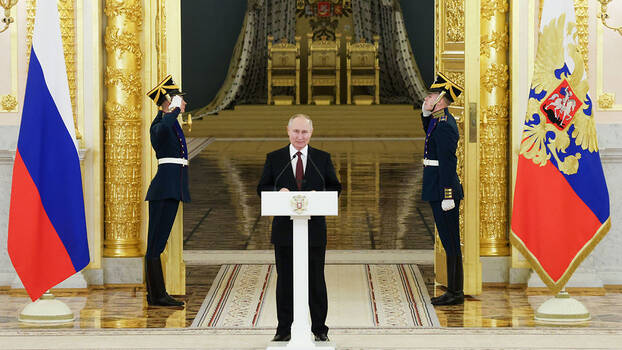
The Russian invasion of Ukraine and the annexing of the occupied Eastern Ukrainian territories constitute a preliminary culmination of the increasingly aggressive and expansionist foreign policy of Vladimir Putin’s government. Over the last 15 years, Russia has carried out numerous military interventions (Georgia, Syria, Kazakhstan) in order to secure its sphere of influence and interests. This contrasts with the country’s foreign policy in the 1990s, which was more consensus-oriented and aimed at a rapprochement with the West.
Felix Jaitner is a political scientist with a doctorate on economic development in Russia supported by the Rosa Luxemburg Foundation. His dissertation, Russland: Ende einer Weltmacht. Vom autoritär-bürokratischen Staatssozialismus mit Ressourcenextraktivismus und Kriegswirtschaft in die Zukunft?, was published in 2023.
Attempts to explain the transition to an aggressive foreign policy have been overwhelmingly limited to the personal motives of the Russian president or the country’s imperial interests. Exemplary here is the speech of German Chancellor Olaf Scholz at the UN General Assembly in September 2022. He characterized the Russian invasion as “the return of imperialism” and “a disaster also for our peaceful global order, which is the antithesis of imperialism and neo-colonialism”.
Interestingly, the other side also cites the struggle against imperialism in justifying the war of aggression against Ukraine. Since the war began, Vladimir Putin has repeatedly presented the Russian invasion as a preventative measure to weaken Western dominance. Western imperialism and the “ugly neo-colonial system of international relations” required a military response on Russia’s part for the sake of a multipolar world order, the Russian president said at the International Economic Forum in Saint Petersburg in June 2023.
The blanket accusation of imperialism makes clear that insufficient effort has been made by politicians and academics to analyse the reasons for the Russian invasion. This leads to the loss of the analytical kernel that the concept of imperialism originally possessed, reducing it to a cliché of moral outrage. This has far-reaching consequences, as it pushes possible paths to ending the war far into the distance. As a result of the war in Ukraine, the destabilization of the whole post-Soviet realm is proceeding apace, as is made clear by the recent escalation of the war in Nagorno-Karabakh, and the Tajik–Kyrgyz border conflict in Central Asia.
The present study does not aim to explain whether Russia is an imperial power or not. Instead, it seeks to demonstrate the relation between its crisis-prone domestic development and its increasingly expansive and militaristic foreign policy. The shift in Russia’s foreign policy strategy must be considered in the context of numerous global crises (the consequences of the 2008–09 global financial crisis, the Coronavirus pandemic, and climate change) and geopolitical upheavals (the rise of China and India). These events have had profound impacts on the post-Soviet realm and are intensifying already potent crises that have destabilized the region in the wake of the dissolution of the Soviet Union and the transition to capitalism, as can be seen in inter-state wars and civil wars as well as in struggles for political dominance.
This text argues that the ongoing consolidation of authoritarian forms of rule domestically and expansionist and militaristic foreign policy are directly linked to the crisis-prone forms of regulation that developed in Russia in the wake of the dissolution of the Soviet Union and the transition to capitalism. These two aspects represent an attempt to stop the country’s loss of influence in the world. Yet increasing authoritarian rule domestically and the violent politics of the ruling bloc both domestically and internationally intensify social contradictions and crises in the post-Soviet realm and in Russia, which can be seen in the increasing escalations in domestic politics.
In the following, two analytical approaches are developed that seek to clarify the specific dynamics of the Russian development model: (1) Russia is a belated capitalist country, which — unlike the Soviet Union — is not striving to develop an alternative system to the West but is rather demanding its rightful place among the world’s great powers; (2) the Russian bourgeoisie has only limited capacity to impose hegemony. The inability of the ruling bloc to create acceptance of the capitalist transformation among the population favours the development of authoritarian relations domestically and makes Russia’s bid for supremacy in the post-Soviet realm more difficult to achieve, and so also the global ambitions of Russian capital factions.
In this context, it becomes clear that the crisis-prone extractive development model that arose in the 1990s is obstructing Russia’s capitalist development and hindering the international expansion of domestic capital factions. This is why the Russian power bloc’s strategies to deal with the various crises form an important part of the present study. This holds as much for the authoritarian modernization project (and its failure) represented by Vladimir Putin as for the conflicts between competing capital factions in the wake of the 2007–8 economic and financial crisis and the mass social protests of 2011–13. In this, Russian efforts to develop a post-Soviet integration project (the Eurasian Union) play a prominent role. In closing, current tendencies in Russian capitalism and their impacts on the future development of the country are analysed.